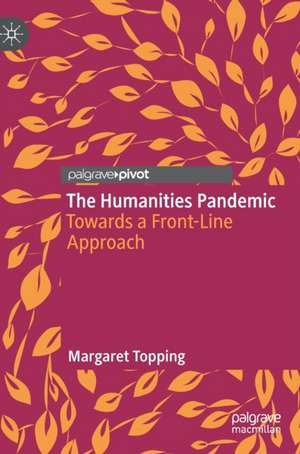The Humanities Pandemic: Towards a Front-Line Approach
Autor Margaret Toppingen Limba Engleză Hardback – 26 iul 2023
Preț: 280.65 lei
Nou
Puncte Express: 421
Preț estimativ în valută:
53.72€ • 58.37$ • 45.15£
53.72€ • 58.37$ • 45.15£
Carte disponibilă
Livrare economică 31 martie-14 aprilie
Livrare express 15-21 martie pentru 30.40 lei
Preluare comenzi: 021 569.72.76
Specificații
ISBN-13: 9783031316289
ISBN-10: 3031316282
Pagini: 145
Ilustrații: XII, 145 p. 26 illus.
Dimensiuni: 148 x 210 x 18 mm
Greutate: 0.35 kg
Ediția:1st ed. 2023
Editura: Springer Nature Switzerland
Colecția Palgrave Macmillan
Locul publicării:Cham, Switzerland
ISBN-10: 3031316282
Pagini: 145
Ilustrații: XII, 145 p. 26 illus.
Dimensiuni: 148 x 210 x 18 mm
Greutate: 0.35 kg
Ediția:1st ed. 2023
Editura: Springer Nature Switzerland
Colecția Palgrave Macmillan
Locul publicării:Cham, Switzerland
Cuprins
1. Introduction: We Need to Talk about Covid.- 2 Cosmopolitanism, Monoculture and Inequality.- 3 Mobility Matters: Checkpointization, Rights and a New Way to Travel.- 4 An Intercultural Roadmap for Intersectoral and Interdisciplinary Collaboration.- 5 Conclusion: What Next for the Humanities?.
Notă biografică
Margaret Topping is Professor of French and Intercultural Communication at Queen’s University Belfast, UK. She has published extensively in the fields of travel and intercultural encounter, as well as on the public value of the Humanities. She is the author of Supernatural Proust: Myth and Metaphor in La Recherche Du Temps Perdu (2007) and Proust's Gods: Christian and Mythological Figures of Speech in the Works of Marcel Proust (2000).
Textul de pe ultima copertă
This book explores how the Humanities can play an essential services role in addressing global challenges such as the Covid pandemic. In arguing for their contribution alongside that of the Health Sciences, it calls for a new critical engagement – honest and self-reflective – from Humanities scholars with the question of how to overcome a fundamental challenge facing universities globally: finding a common language and set of ‘cultural’ assumptions between disciplines as the basis for communication. The book looks at the nature of the challenges that can beset collaboration across disciplines (and indeed across sectors, notably between researchers and the general public) and argues for a new Translational Humanities, in both the sense of an applied Humanities and a Humanities that can translate itself across disciplines and sectors. Crucially, too, it suggests that it is not narratives such as a pandemic novel or contagion film that successfully engagewith contentious debates about the challenges of Covid, but rather critically distant texts and thematic contexts that typically place the self in the position of other like travel narratives. This book sits at a previously unconsidered intersection between debates around interdisciplinary collaboration and communication, theories of intercultural contact and encounter, and the role of the Humanities in tackling global issues.
Margaret Topping is Professor of French and Intercultural Communication at Queen’s University Belfast, UK. She has published extensively in the fields of travel and intercultural encounter, as well as on the public value of the Humanities. She is the author of Supernatural Proust: Myth and Metaphor in La Recherche Du Temps Perdu (2007) and Proust's Gods: Christian and Mythological Figures of Speech in the Works of Marcel Proust (2000).
Margaret Topping is Professor of French and Intercultural Communication at Queen’s University Belfast, UK. She has published extensively in the fields of travel and intercultural encounter, as well as on the public value of the Humanities. She is the author of Supernatural Proust: Myth and Metaphor in La Recherche Du Temps Perdu (2007) and Proust's Gods: Christian and Mythological Figures of Speech in the Works of Marcel Proust (2000).
Caracteristici
Offers a practical roadmap to help researchers seeking to have front-line impact Addresses failure of communication between the Sciences and the Humanities Makes a case for an arts and humanities response to Covid and its aftermath
